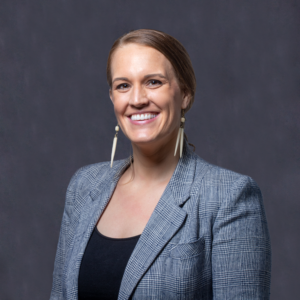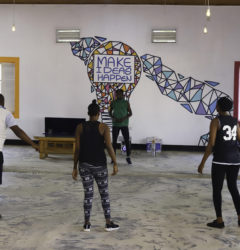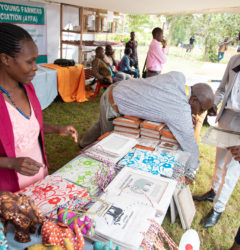23 Jun

When The Mastercard Foundation launched its Young Africa Works strategy in Uganda in July 2020, it was met with a lot of anticipation about how transformative it would be in the area of youth employment.
As a nation, Uganda has long been a beneficiary of The Mastercard Foundation through its 10-year global initiative, The MasterCard Foundation Scholars Program. Through this program, into which $12 million was injected, the Foundation supports young but brilliant Ugandans to achieve education, ushering them safely into becoming the next generation leaders who will contribute to social and economic progress, particularly in Africa.
While at the launch, the Minister of Education and Sports, Janet Kataaha Museveni reported that in the last decade, already 6000 scholars in Uganda have benefited from this Scholars program
The Foundation went ahead to ensure that the youth who are equipped with education are not just able to find sustainable and dignified work, they are able to create jobs. Their target is to enable more than three million young people in the country to access dignified and fulfilling work opportunities by 2030. To this cause, The Foundation injected $200 million.
The prioritization of youth employment and job creations can be justified by the rate of youth unemployment that has long been a key concern for youth and the nation’s leadership. Already in the works has been the Youth Livelihood Programme (YLP), an intervention by the Ugandan government in response to the high unemployment rate and poverty among the youth in the country. In this program alone, the government injected Shs1.3 billion to boost job creation for the youth.
When The Mastercard Foundation launched its Young Africa Works Strategy in Uganda in July 2020, it was met with a lot of anticipation about how transformative it would be in the area of youth employment.
At the launch, President Yoweri Museveni applauded The Mastercard Foundation for joining hands towards these efforts.
“The youth employment challenge is already half-solved because the foundation for socio-economic transformation has been laid. Government welcomes the efforts of the Mastercard Foundation as an important partner in skilling the youth and creating jobs and wealth,” he said, describing the Mastercard Foundation as “a true friend of Uganda.”
A year before the launch of the Young Africa Works Strategy in 2020, The Innovation Village had launched the NextWave Program, a market-led five-year intervention addressing the key ecosystem challenges of job creation for youths in Uganda.
The NextWave program was adopted under the Young Africa Works strategy of The Mastercard Foundation because of its agenda to enable youth to create jobs through skilling and linkages to jobs and markets for products and services.
Under this strategy, nine implementing partners were taken on to work with The Innovation Village with a goal of enabling 300,000 Ugandan youths to find dignified work by 2030. The implementing partners include Kitchen Station, Rego Foundation, Ghetto Research Lab, Gulu University, Agency For Community Empowerment (AFCE), Hive Collab Mbarara, Smart Girls Foundation Uganda and Zimba Women.
The Innovation Village Programs Lead Kristine Owiny believes that the choice to adopt NextWave under the Young Africa Works strategy emanated from the foundation that had been laid by The Innovation Village and the work already in motion.
“We had cross-industry expertise and a growing membership of startups that we could tap into. This knowledge base provided a foundation for scale — and scale we have! Now, we have our locations in Kampala, Jinja, Gulu, Mbarara, and our creative space, MoTIV, in Bugolobi. Funding from The Mastercard Foundation has allowed us to not only meet the needs of young, budding entrepreneurs in Kampala but across Uganda,” she says.

As innovation unfolds, Owiny says it is through collaboration and partnerships that The Innovation Village is able to meet the unique needs of entrepreneurs in different spaces.
“We are excited to continue to build our expertise to provide better services and support,” she says.
One of the thriving illustrations of the impact of the support from The Mastercard Foundation is the work that goes on in Nebbi and Jumbo districts under the Agency For Community Empowerment (AFCE) organization that runs a youth skilling project.
In these districts, they have sighted employment opportunities in the region from the resources available. The employment opportunities sighted are Bee Keeping, Liquid Soap Making and Hairdressing.
In these areas, the organization has been able to train over 400 youth in beekeeping and the making of local beehives. In hairdressing, they have been able to train 115 youth through salon apprenticeship who are now monetizing their skills. While in the craft of soap making, 167 youth have been trained under the program.
“The Foundation has been very, very helpful in supporting us to achieve our objectives towards empowering young people in this region. I am grateful,” AFCE operations officer, Tonny Opio, concludes.
As the implementing partners began their work towards the goal, the global COVID-19 pandemic arrested the momentum leading to a regression in a lot of businesses, a loss of jobs and complication of livelihoods.
Gilbert Buregyeya is the Program Lead at Makerere Innovation and Incubation Center (MIIC). This innovation hub is one of the centres that has benefited from the support of The COVID-19 Rebound Program. He speaks about the effects of the pandemic and how the program has helped them recover.
“The hub thrived on renting out space and running a number of events for entrepreneurs. In a week, we had about 50 entrepreneurs coming in to use the space. When the pandemic hit, we were forced to halt our activities, close up and lay off workers. This resulted in a loss of our sources of income and client base. However, with the support from the program, we have been able to get back on our feet and support young innovators through our various programs.”
While running programs on enterprise development and work readiness, Makerere Innovation and Incubation Center with the support from the rebound program has been able to train around 609 youth and link over 80 youth to jobs while creating 17 direct jobs in a period of six months.
In response to this, The Foundation lent its support towards The Covid-19 Rebound Program which was meant to reinforce resilience and aid recovery of businesses during and post-pandemic.
The Portfolio Manager of the implementing partners under the rebound program, Vanessa Tandekwiire Onek says the 18-month program that began in June 2020 and will end in 2021 has been able to support 704 businesses in the cottage industry. In addition to that, 5,450 entrepreneurs have been skilled, 704 businesses are receiving support, 865 businesses have been linked to mentorship or to the market place while 832 jobs have been created under the rebound program.
With these results, they are optimistic that through the COVID-19 rebound program, young businesses that have been through business training, skills development, access to tools and funds will be able to withstand the current times and aftermath of the pandemic.
With gender equality being at the forefront of The Mastercard Foundation, these efforts have resulted in increasing access to knowledge, tools and funds that have enabled more women to engage in socio-economic enterprises. At the moment, almost 45 per cent of the beneficiaries are women across the various initiatives and there is optimism that the implementing partners will be able to hit the target of 70 per cent women, in its inclusion efforts.
Looking over the journey since the inception of all these programs, Owiny reports that in less than two years of implementation, together with our partners on the NextWave program, they have provided skills training to nearly 16,000 young people across the country. Additionally, they have enabled the linkage of nearly 4,000 young people to opportunities by providing market access, access to capital, or internships and nearly 2,500 jobs have been created.
“At The Innovation Village, we are excited about the wealth of knowledge we have attained during this time and continue to work to improve our processes and engagement,” she says.
Owiny further adds that in the months ahead, what is working must be elevated to achieve the massive goal of creating sustainable and dignified work for young people.
Adding to the rest of the stakeholders, there is an expression of gratitude towards the community that The Mastercard Foundation has fostered between all Ugandan partners under the Young Africa Works strategy. The Program Lead believes that by working together, the ecosystem will go far.










Recent Comments